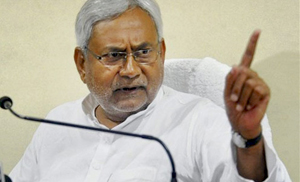Patna, Sep 3: In a protest against Prime Minister Narendra Modi's DNA remark on Chief Minister Nitish Kumar, Bihar's ruling JD-U will send one lakh hair and nail samples to the prime minister office everyday starting Thursday, a party leader said.
"We will send one lakh hair and nail samples of party leaders, workers and supporters starting September 3 to the prime minister office (PMO)," JD-U leader N.K. Arya said.
He said five million samples would be sent by the Janata Dal-United till October 15.
"We have already collected nearly one million hair and nail samples of people," Arya said, adding "We have given a target to party leaders, including legislators, MPs and others to collect samples for DNA test from their respective constituencies across the state".
Nitish Kumar and Rashtriya Janata Dal (RJD) chief Lalu Prasad have been trying hard to link the DNA issue with the self respect of Bihar.
The JD-U launched a "shabdwapasi" campaign to put pressure on the prime minister to take back his remark and began a drive to collect signatures.
Addressing a public meeting in Muzaffarpur on July 25, Modi said: "There seems to be some problem in his (Nitish Kumar) DNA because the DNA of democracy is not like that. In democracy, you give respect even to your political rivals."






Comments
Add new comment